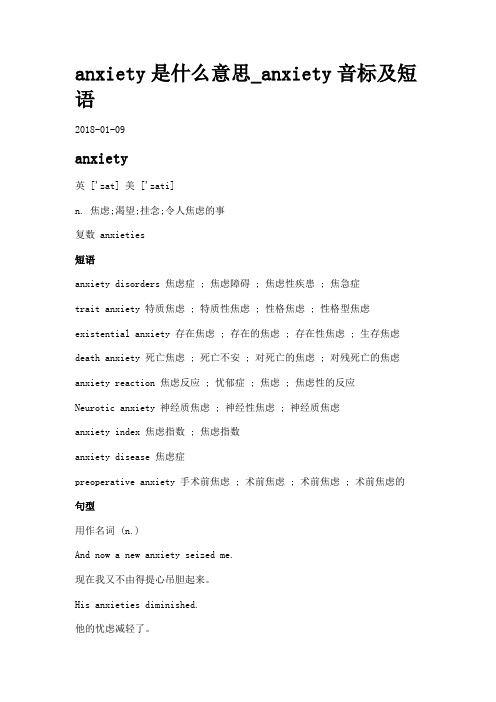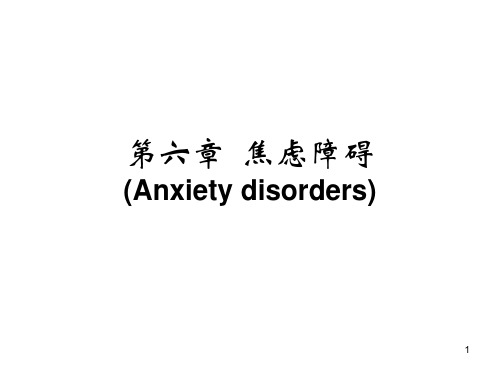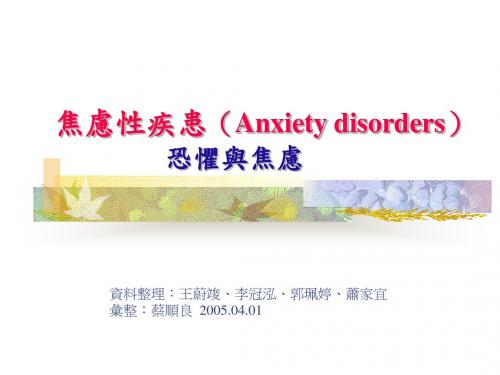Anxiety disorders
- 格式:ppt
- 大小:488.00 KB
- 文档页数:49

anxiety是什么意思_anxiety音标及短语2018-01-09anxiety英 ['zat] 美 ['zati]n. 焦虑;渴望;挂念;令人焦虑的事复数 anxieties短语anxiety disorders 焦虑症 ; 焦虑障碍 ; 焦虑性疾患 ; 焦急症trait anxiety 特质焦虑 ; 特质性焦虑 ; 性格焦虑 ; 性格型焦虑existential anxiety 存在焦虑 ; 存在的焦虑 ; 存在性焦虑 ; 生存焦虑death anxiety 死亡焦虑 ; 死亡不安 ; 对死亡的焦虑 ; 对残死亡的焦虑anxiety reaction 焦虑反应 ; 忧郁症 ; 焦虑 ; 焦虑性的反应Neurotic anxiety 神经质焦虑 ; 神经性焦虑 ; 神经质焦虑anxiety index 焦虑指数 ; 焦虑指数anxiety disease 焦虑症preoperative anxiety 手术前焦虑 ; 术前焦虑 ; 术前焦虑 ; 术前焦虑的句型用作名词 (n.)And now a new anxiety seized me.现在我又不由得提心吊胆起来。
His anxieties diminished.他的忧虑减轻了。
Her anxieties deepened with each passing day.她的忧虑与日俱增。
用法n.(名词)anxiety的基本意思是“焦虑,着急(的情绪)”,指因悬而未决或吉凶难卜的事而引起的焦虑与紧张不安,也可指因即将到来的灾难或不幸而产生的恐惧与忧虑。
anxiety作“令人着急、焦虑的事”解,是可数名词,引申可表示为某事焦虑,常译成“渴望,热望”,是不可数名词。
anxiety后可接由that引导的同位语从句,从句中的谓语动词多用“should+动词原形”, should有时可省略。
词汇辨析anxiety,worry,care,concern这些名词均含“焦虑、关心”之意。

有关焦虑症的英语作文Title: Understanding Anxiety Disorders。
Anxiety disorders affect millions of people worldwide, manifesting in various forms and intensities. This essay aims to explore the nature of anxiety disorders, their impact on individuals and society, as well as potential coping strategies and treatments.Firstly, it's crucial to define anxiety disorders. They encompass a range of mental health conditions characterized by excessive fear, worry, and apprehension. These feelings are often irrational and disproportionate to the actual threat posed by a situation. Common types of anxiety disorders include generalized anxiety disorder (GAD), panic disorder, social anxiety disorder, and specific phobias.The causes of anxiety disorders are multifaceted andcan include genetic predispositions, brain chemistry, personality factors, and life experiences. Traumatic events,chronic stress, and imbalances in neurotransmitters like serotonin and dopamine can all contribute to the development of anxiety disorders.The impact of anxiety disorders on individuals can be profound. They can disrupt daily functioning, impair performance at work or school, strain relationships, and lead to physical health problems such as headaches, digestive issues, and insomnia. Moreover, untreated anxiety disorders can exacerbate other mental health conditionslike depression, substance abuse, and even suicidal ideation.Beyond the personal level, anxiety disorders also impose a significant burden on society. They contribute to increased healthcare costs, decreased productivity in the workforce, and higher rates of disability claims. Additionally, the stigma surrounding mental illness often prevents individuals from seeking help, further perpetuating the cycle of suffering and societal costs.Fortunately, there are various coping strategies andtreatments available for anxiety disorders. These may include cognitive-behavioral therapy (CBT), which helps individuals identify and challenge negative thought patterns and behaviors. Relaxation techniques such as deep breathing, meditation, and progressive muscle relaxation can also alleviate symptoms by reducing physiological arousal.In addition to therapy, medication may be prescribed in some cases to manage symptoms. Antidepressants, benzodiazepines, and beta-blockers are among the medications commonly used to treat anxiety disorders. However, it's essential to work closely with a healthcare professional to determine the most appropriate treatment plan, as medication alone may not address the underlying causes of anxiety.Moreover, lifestyle modifications such as regular exercise, adequate sleep, healthy eating habits, and minimizing stressors can complement professional treatment and promote overall well-being. Building a strong support network of friends, family, and mental health professionalsis also crucial for managing anxiety disorders effectively.In conclusion, anxiety disorders are complex mental health conditions that can have profound effects on individuals and society as a whole. Understanding the causes, impact, and available treatments for anxiety disorders is essential for promoting awareness, reducing stigma, and improving outcomes for those affected. With the right support and interventions, individuals with anxiety disorders can lead fulfilling lives and contribute positively to their communities.。


紧张综合征名词解释紧张综合征(AnxietyDisorder)是指一组表现为持续性、强烈的不安、焦虑、惊恐和恐惧等精神症状的疾病,它常常会影响某一个或多个方面的个体生活,影响个体的情绪、行为、身体状况、学习成绩、社交行为等。
它可能会造成个体在精神和身体上的痛苦,并且严重地影响个体的正常生活。
紧张综合征包括常见恐惧症(phobia)、强迫症(obsessive- compulsives disorder)、社交焦虑症(social anxiety disorder)、逃避性人格障碍(avoidant personality disorder)、强迫性障碍(compulsive disorder)、抑郁症(depression)、恐慌症(panic disorder)、癔症(mania)、先天性敏感性综合症(PTSD)。
常见恐惧症是一种特殊的紧张综合征,它指的是个体对某种特定的事物、场合,或者活动有极强烈的恐惧感,并且和客观真实的危险无关。
比如,一些患者在看见或者接近某种畜类时极度害怕,那么这就属于动物恐惧症;另外一些患者可能会因为在严重的拥挤环境下而产生极度的焦虑感,那么可以认为这是一种拥挤恐惧症。
强迫症是一种行为类的紧张综合征,它通常表现为患者反复做某种特定的行为,或者反复思考某种特定的想法,这些行为和想法对患者来说是无意义的,然而,患者会一再重复这些行为和想法,以致无法抗拒这类行为和想法。
从具体描述来看,患者可能会被一些无形的恐惧所支配,或者被一些强迫性的错觉所影响,因此,会不断清洗手,整理物品,不断地重复动作,不断地对其自身的安全进行检查等。
社交焦虑症是指患者在面对社会交往时会产生极强烈的害怕感,心里会产生深深的恐惧和焦虑,害怕别人接近、害怕别人看到自己,害怕自己在他人面前表现的不好,会感觉别人在把自己嘲笑,也会害怕在别人面前表达自己的想法和感受等。
逃避性人格障碍指的是患者的个性特征是一种紧张状态,患者常常害怕别人拒绝自己,担心自己在社交场合表现的很差,会有强烈的自卑感,担心自己的行为会受到抨击,也会不去参加社交互动,通常用各种理由来逃避社交聚会等。

心理压力英语随着社会的不断发展,人们的生活水平不断提高,但同时也面临着更多的压力。
心理压力是指在生活、学习、工作和社交等方面遭受的精神上的压力。
这种压力会对人们的身心健康产生不良影响,因此需要了解和掌握一些相关的英语知识。
一、心理压力的表现1. Anxiety(焦虑): People with anxiety disorders frequently have intense, excessive and persistent worry and fear about everyday situations. This can interfere with their daily activities and make them avoid certain situations.2. Depression(抑郁): Depression is a common mental disorder that causes people to experience sadness or loss of interest or pleasure in activities, along with other symptoms. It can lead to a variety of emotional and physical problems and can decrease a person's ability to function at work and home.3. Insomnia(失眠): Insomnia is a sleep disorder that is characterized by difficulty falling asleep, staying asleep, or waking up too early in the morning. It can be caused by a variety of factors, including stress, anxiety, depression, and medical conditions.4. Fatigue(疲劳): Fatigue is a feeling of tiredness or exhaustion that can be caused by physical or mental exertion,illness, or lack of sleep. It can interfere with a person's ability to function at work or home.5. Irritability(易怒): Irritability is a feeling of frustration or anger that can be caused by stress, anxiety, or other emotional factors. It can lead to conflicts with others and can interfere with a person's ability to function at work or home.二、心理压力的原因1. Work-related stress(工作压力): Work-related stress can be caused by a variety of factors, including long hours, heavy workload, difficult colleagues or bosses, and job insecurity.2. Financial stress(财务压力): Financial stress can be caused by debt, unemployment, or other financial difficulties. It can lead to anxiety, depression, and other mental health problems.3. Relationship stress(人际关系压力): Relationship stress can be caused by conflicts with family members, friends, or romantic partners. It can lead to feelings of frustration, anger, and sadness.4. Health-related stress(健康压力): Health-related stress can be caused by chronic illness, disability, or other health problems. It can lead to anxiety, depression, and other mentalhealth problems.5. Life changes(生活变化): Life changes such as moving, getting married, or having a baby can be stressful. These changes can disrupt a person's routine and can lead to feelings of uncertainty and anxiety.三、缓解心理压力的方法1. Exercise(运动): Exercise can help reduce stress and improve overall mental health. It can also help improve physical health, which can in turn help reduce stress.2. Relaxation techniques(放松技巧): Relaxation techniques such as deep breathing, meditation, and yoga can help reduce stress and improve overall mental health.3. Social support(社交支持): Social support from friends, family, or support groups can help reduce stress and improve overall mental health.4. Time management(时间管理): Time management techniques such as prioritizing tasks and setting realistic goals can help reduce stress and improve overall mental health.5. Professional help(专业帮助): Professional help froma therapist or counselor can help reduce stress and improve overall mental health. They can provide support and guidance in dealing with stress and other mental health issues.总之,心理压力是现代人们面临的一个重要问题,但我们可以通过了解和掌握相关的英语知识来缓解压力,保持身心健康。

介绍焦虑症英文作文Understanding Anxiety Disorders。
Anxiety disorders are prevalent mental health conditions characterized by excessive worry, fear, and apprehension. These disorders can significantly impact a person's daily life, relationships, and overall well-being. It's essential to comprehend the various forms of anxiety disorders, their symptoms, and potential treatments to support individuals affected by these challenges.Types of Anxiety Disorders。
There are several types of anxiety disorders, each with unique characteristics:1. Generalized Anxiety Disorder (GAD):GAD involves persistent and excessive worry about various aspects of life, such as work, health, orrelationships, even when there is no apparent reason for concern. Individuals with GAD often experience restlessness, irritability, muscle tension, and difficulty concentrating.2. Panic Disorder:Panic disorder is characterized by recurrent and unexpected panic attacks—intense periods of fear or discomfort accompanied by physical symptoms like heart palpitations, sweating, trembling, and feelings of impending doom.3. Social Anxiety Disorder (SAD):SAD, also known as social phobia, involves anintense fear of social situations and scrutiny by others. People with SAD may avoid social gatherings, public speaking, or interactions that could trigger anxiety.4. Specific Phobias:Specific phobias are irrational fears of particularobjects or situations, such as heights, spiders, flying, or enclosed spaces. When confronted with the phobic stimulus, individuals may experience extreme anxiety or panic.5. Obsessive-Compulsive Disorder (OCD):OCD involves intrusive thoughts (obsessions) that lead to repetitive behaviors or mental acts (compulsions). These rituals are performed to alleviate anxiety but often provide only temporary relief.6. Post-Traumatic Stress Disorder (PTSD):PTSD can develop after experiencing a traumatic event. Symptoms include flashbacks, nightmares, severe anxiety, and emotional numbness.Symptoms。
心理疾病英语心理疾病在英语中通常被称为"mental disorders" 或"psychological disorders"。
以下是一些常见的心理疾病的英语表达:1.抑郁症(Depression):Depression is a mood disordercharacterized by persistent feelings of sadness, hopelessness, and a lack of interest in daily activities.2.焦虑症(Anxiety Disorder):Anxiety disorder involvesexcessive and uncontrollable worry or fear about everyday situations.3.精神分裂症(Schizophrenia):Schizophrenia is a severe mentaldisorder characterized by disorganized thinking, hallucinations, delusions, and disrupted social functioning.4.双相情感障碍(Bipolar Disorder):Bipolar disorder, alsoknown as manic-depressive illness, involves extreme mood swings, including episodes of mania and depression.5.强迫症(Obsessive-Compulsive Disorder, OCD):OCD is ananxiety disorder characterized by intrusive thoughts (obsessions) and repetitive behaviors or mental acts (compulsions).6.创伤后应激障碍(Post-Traumatic Stress Disorder, PTSD):PTSD is a mental health condition triggered by experiencing or witnessing a traumatic event, causing symptoms such as flashbacks, nightmares, and severe anxiety.7.注意力缺陷多动症(Attention-Deficit/Hyperactivity Disorder,ADHD):ADHD is a neurodevelopmental disorder characterized by persistent patterns of inattention, hyperactivity, and impulsivity.8.自闭症谱系障碍(Autism Spectrum Disorder, ASD):ASD isa developmental disorder that affects communication, socialinteraction, and behavior.9.饮食障碍(Eating Disorders):Eating disorders, such asanorexia nervosa and bulimia nervosa, involve abnormal eating behaviors and attitudes towards food and body weight.10.人格障碍(Personality Disorders):Personality disorders arecharacterized by enduring patterns of inner experience and behavior that deviate from cultural expectations, causing distress or impairment.请注意,以上术语可能有时会有一些细微的区别,具体表达可能因国家、文化和专业领域而有所不同。
精神疾病名词解释精神疾病是指人类思维、情感、行为和社交功能发生异常的一类疾病。
精神疾病可以以各种形式表现,如情绪障碍、认知障碍、行为障碍、人格障碍等,严重时会对患者本人和周围社会造成严重影响。
1. 抑郁症(Depression):患者持续感到沮丧、无助、自责,丧失兴趣和快乐感,伴随睡眠障碍、食欲改变、注意力不集中等症状。
2. 焦虑症(Anxiety disorder):表现为持续的焦虑、紧张和恐惧,伴随心悸、呼吸困难、出汗等生理症状,常常干扰个人日常生活。
3. 双相情感障碍(Bipolar Disorder):患者情绪波动明显,出现周期性的抑郁和躁狂发作,躁狂期时情绪高涨、冲动、活力增加,抑郁期则表现为低落、自卑。
4. 精神分裂症(Schizophrenia):患者遭受幻觉、妄想、思维混乱、情绪不稳定等症状,导致对现实的认知和社交功能受损。
5. 应激障碍(Stress Disorder):由于严重的创伤或应激事件引起的焦虑、恐惧和回忆性困扰,如创伤后应激障碍(PTSD)。
6. 强迫症(Obsessive-Compulsive Disorder):患者有反复出现而难以控制的强迫思维或行为,如反复洗手、检查,以减轻焦虑感。
7. 注意力缺陷多动障碍(Attention Deficit Hyperactivity Disorder,ADHD):儿童或成人的注意力集中困难、多动、冲动,并且常常影响学业和工作表现。
8. 食物摄入障碍(Eating Disorders):包括厌食症(Anorexia Nervosa)和暴食症(Bulimia Nervosa),患者对食物有异常的态度和行为,导致体重和健康问题。
9. 睡眠障碍(Sleep Disorders):包括失眠症、睡眠呼吸暂停、过度入睡等,患者无法正常入睡、睡眠中断或睡眠质量差,导致白天疲倦和注意力不集中。
10. 人格障碍(Personality Disorders):患者的思维、情感和行为模式长期稳定,偏离正常社会期待,如孤独型、边缘型等。